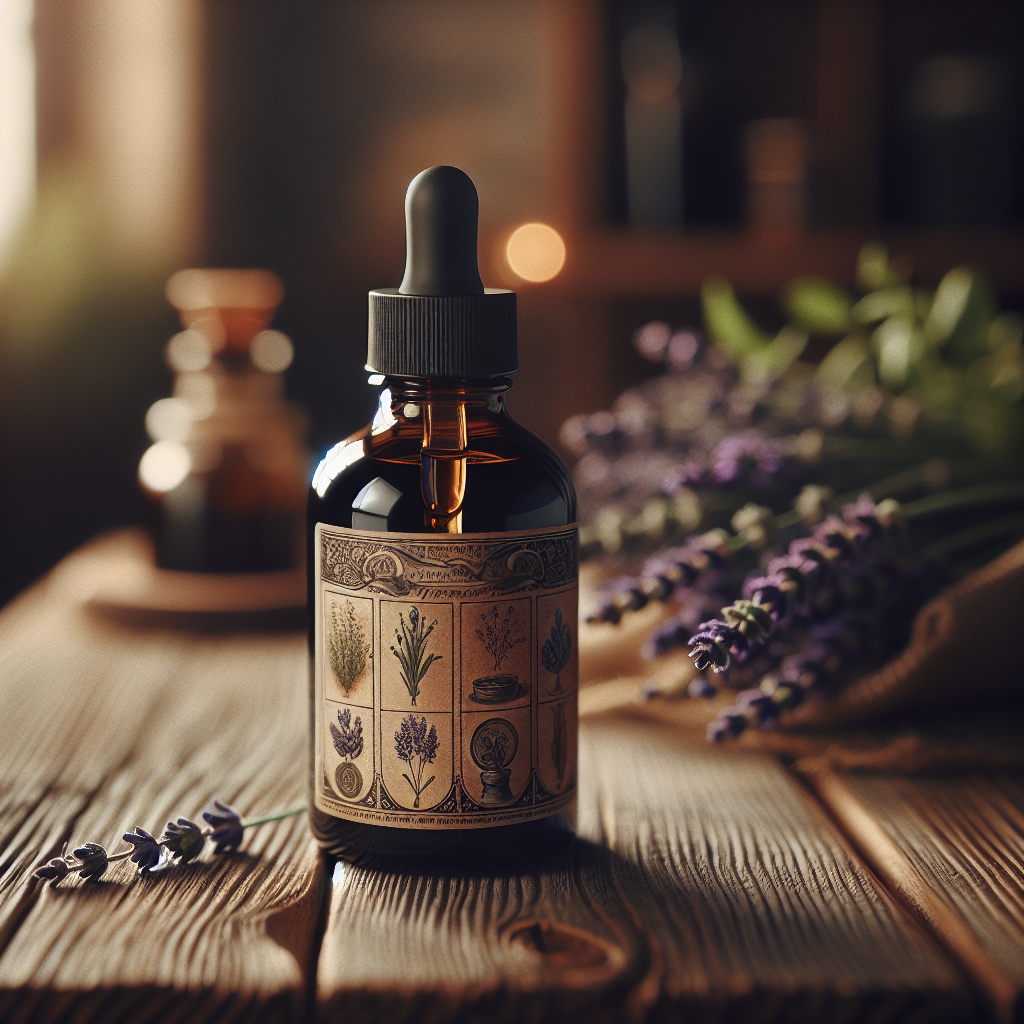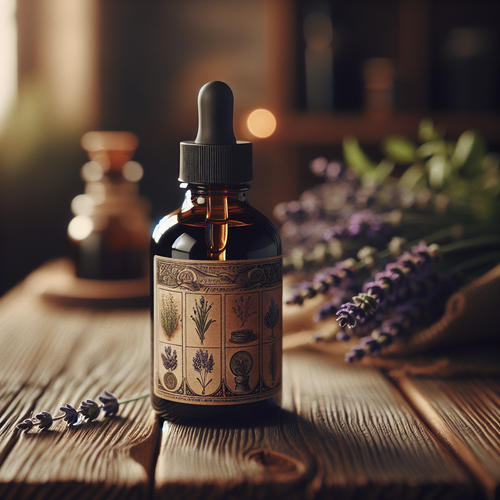The Ultimate Guide to Herbal Tinctures: How to Make, Use, and Master the Art of Extraction
Posted by Sarah Aries Holistic Herbalist on Mar 11th 2025
Mastering the Art of Tincture Making: The Ultimate Guide
Tincture making is a time-tested method of extracting and preserving the medicinal compounds of herbs and plants using alcohol, glycerin, or vinegar as a solvent. These concentrated herbal extracts provide a potent, convenient, and long-lasting way to support health and wellness.
Whether you're a beginner or an experienced herbalist, this guide will take you through everything you need to know—from choosing the best herbs and solvents to advanced tincture-making techniques.
 Key Takeaways
Key Takeaways
✅ Understanding tincture making ensures better extraction and potency.
✅ Choosing the right herbs and solvent is crucial for an effective tincture.
✅ Step-by-step guidance helps beginners make tinctures successfully.
✅ Proper storage and care maintain tincture potency for years.
✅ Exploring advanced techniques and herbal combinations enhances benefits.
What Are Tinctures and Why Are They Powerful?
A tincture is a highly concentrated herbal extract made by soaking leaves, seeds, roots, bark, or flowers in alcohol, glycerin, or vinegar. The solvent extracts the active compounds, preserving them for extended use.
✔ Why Use Tinctures?
- Fast absorption – More bioavailable than teas or capsules.
- Long shelf life – Alcohol-based tinctures last 3-5 years.
- Convenient dosage – A few drops under the tongue or in water.
- Highly concentrated – Stronger than most other herbal preparations.
Choosing the Right Herbs & Solvent for Tinctures
Best Herbs for Tincture Making & Their Benefits
| Herb | Best For | Solvent |
|---|---|---|
| Echinacea | Immune support | Alcohol |
| Chamomile | Relaxation & sleep | Alcohol or Glycerin |
| Ginger | Digestion & anti-inflammatory | Alcohol |
| Ashwagandha | Stress & adrenal support | Alcohol |
| Elderberry | Immune boosting | Alcohol or Glycerin |
| Valerian | Sleep & anxiety relief | Alcohol |
Comparison Chart: Glycerin Tinctures vs. Alcohol Tinctures vs. Vinegar Tinctures
| Aspect | Glycerin Tinctures | Alcohol Tinctures | Vinegar Tures |
|---|---|---|---|
| Base Ingredient | Vegetable glycerin | Ethanol (alcohol) | Vinegar (usually apple cider vinegar) |
| Taste | Sweet and more palatable | Bitter or strong taste | Sour and tangy |
| Solubility | Water-soluble and fat-soluble | Soluble in water and fat | Water-soluble |
| Preservation | Shorter shelf life (1-2 years) | Longer shelf life (5-10 years) | Moderate shelf life (1-2 years) |
| Extraction Efficiency | Less efficient for some compounds | More efficient for extracting active ingredients | Moderate extraction efficiency |
| Alcohol Content | Alcohol-free or very low | High alcohol content (20-60%) | Alcohol-free or very low |
| Best For | Children, sensitive individuals | Adults; more potent herbal extracts | Health-conscious individuals |
| Usage | Easy to consume, used in beverages | Typically used in herbal medicine | Used for culinary and health purposes |
How to Make Herbal Tinctures
(Step-by-Step Guide)
I. Making an Alcohol Tincture
Ingredients & Equipment
✔ 1 cup dried or 2 cups fresh herbs (finely chopped)
✔ 2 cups high-proof alcohol (Vodka, Brandy, or 40-70% Ethanol)
✔ Glass jar with a tight lid
✔ Cheesecloth or fine mesh strainer
✔ Dark glass bottles (for storage)
✔ Labels & marker (for identification)
Instructions
Step 1: Prepare the Herbs
Finely chop or grind herbs to increase surface area.
Place herbs in a clean, dry glass jar (fill ½ to ¾ full).
Step 2: Add Alcohol
Pour alcohol over herbs until fully submerged.
Seal the jar tightly.
Step 3: Infusion & Maceration
Store in a cool, dark place for 4-6 weeks.
Shake daily for best extraction.
Step 4: Strain & Bottle
After 4-6 weeks, strain the tincture using cheesecloth.
Press herbs to extract remaining liquid.
Transfer to dark glass bottles, label with herb name & date.
Step 5: Storage & Usage
Store in a cool, dark place for 3-5 years.
Take 30-60 drops in water or juice as needed.
II. Making a Glycerin Tincture (Glycerite)
Ingredients & Equipment
✔ 1 cup dried or 2 cups fresh herbs
✔ 2 cups food-grade vegetable glycerin (80% glycerin, 20% water)
✔ Glass jar, cheesecloth, dark bottles
Instructions
1️⃣ Finely chop herbs & place in a jar.
2️⃣ Pour glycerin mixture until herbs are covered.
3️⃣ Store in a cool, dark place, shake daily for 4-6 weeks.
4️⃣ Strain through cheesecloth, bottle, and label.
5️⃣ Store for 1-2 years, use 30-60 drops as needed.
How to Make Tinctures from Different Plant Parts
| Plant Part | Best Solvent | Alcohol Strength | Extraction Time |
|---|---|---|---|
| Leaves | Alcohol/Glycerin | 40-50% | 4-6 weeks |
| Seeds | Alcohol | 50-60% | 4-6 weeks |
| Bark | Alcohol | 50-70% | 6-8 weeks |
| Roots | Alcohol | 50-70% | 6-8 weeks |
| Flowers | Alcohol/Glycerin | 40-50% | 4-6 weeks |
Advanced Tincture Techniques
✔ Cold vs. Hot Extraction – Cold extraction preserves delicate compounds, hot extraction speeds up the process.
✔ Double Maceration – Steep herbs twice for extra potency.
✔ Herbal Blends – Mix herbs for synergistic effects (e.g., Chamomile + Lavender for relaxation).
Common Tincture Mistakes & How to Fix Them
| Problem | Cause | Solution |
|---|---|---|
| Mold growth | Herbs not fully submerged | Keep herbs completely covered |
| Weak tincture | Too little herb or short extraction time | Use more herbs, extend infusion |
| Cloudy liquid | Fine particles remain | Strain twice with cheesecloth |
Frequently Asked Questions (FAQs)
How long do tinctures last?
Alcohol tinctures last 3-5 years, glycerin tinctures last 1-2 years.
Can I mix alcohol and glycerin?
Yes! This hybrid method offers potency + sweetness.
What is the best alcohol for tinctures?
Vodka, Brandy, or high-proof ethanol (40-70%).
Can tinctures be used topically?
Yes! Some tinctures (like Calendula) are great for skin applications.
When Not to Use Tinctures
While tinctures are powerful and convenient, there are specific situations where caution—or complete avoidance—is necessary:
If You’re Allergic to the Herb
Even natural substances can cause allergic reactions. If you’ve had rashes, hives, difficulty breathing, or other symptoms after using a specific herb (like echinacea or valerian), do not use tinctures made from that herb. Always read labels carefully and consult a practitioner if unsure.
Pregnancy & Breastfeeding
Some herbs in tincture form may stimulate uterine contractions or affect hormone levels. Unless you're working with a qualified healthcare provider or trained herbalist, avoid herbal tinctures during pregnancy and lactation—especially alcohol-based ones.
Examples to avoid without guidance:
-
Dong Quai
-
Goldenseal
-
Blue Cohosh
If You Take Medications
Herbs can interact with prescription drugs, sometimes enhancing or blocking their effects. Be especially cautious if you’re taking:
-
Anticoagulants (e.g., Warfarin): Avoid herbs like ginkgo, ginger, or garlic in tincture form.
-
Sedatives or Sleep Aids: Combining with valerian or passionflower tinctures may increase drowsiness.
-
Blood Pressure Meds: Herbs like hawthorn or licorice may affect blood pressure levels.
✔ Always check for potential herb-drug interactions and consult your provider before starting a tincture regimen.
Alcohol Sensitivity or Recovery
If you’re sensitive to alcohol or in recovery, even small amounts in tinctures may be problematic. Consider glycerin-based tinctures (glycerites) or vinegars instead.
Children Under 2 Years
Alcohol-based tinctures are generally not recommended for infants or toddlers unless properly diluted and approved by a healthcare professional.
Comparison Chart: Glycerine Tinctures vs. Alcohol Tinctures
General Tincture Efficacy & Extraction
-
Alcohol as a Solvent for Herbal Extraction
Study: "A comparative study of ethanol and water as extraction solvents of medicinal herbs."
Conclusion: Ethanol extracts yielded higher concentrations of phenolics and flavonoids.
PubMed Link -
Tinctures and Bioavailability
Study: “Liquid herbal preparations: advantages in bioavailability and pharmacokinetics”
Conclusion: Liquid extracts like tinctures improve absorption rates over capsules.
PubMed Link
Efficacy of Specific Herbs in Tinctures
1. Echinacea (for immune support)
Study: “Echinacea for preventing and treating the common cold”
Conclusion: Some preparations showed reduced cold incidence and duration.
PubMed Link
2. Chamomile (for sleep and relaxation)
Study: “Chamomile: A herbal medicine of the past with bright future”
Conclusion: Demonstrates sedative and calming effects.
PubMed Link
3. Ginger (for digestion and inflammation)
Study: “Ginger – an herbal medicinal product with broad anti-inflammatory actions”
Conclusion: Supports anti-inflammatory and digestive health.
PubMed Link
4. Ashwagandha (adaptogen and stress support)
Study: “A randomized, double-blind, placebo-controlled study of Ashwagandha root extract in reducing stress and anxiety”
Conclusion: Improved stress resistance and reduced cortisol.
PubMed Link
5. Elderberry (immune support)
Study: “Elderberry supplementation reduces cold duration and symptoms in air travelers”
Conclusion: Significantly reduced cold symptoms and duration.
PubMed Link
6. Valerian Root (for sleep support)
Study: “Valerian for sleep: A systematic review and meta-analysis”
Conclusion: Modest improvement in sleep quality and latency.
PubMed Link
Solvent-Specific Studies
-
Glycerin Extracts (Glycerites):
Study: “Comparison of antimicrobial activity between ethanol and glycerin herbal extracts”
Conclusion: Glycerites retained activity but were less potent than alcohol-based tinctures.
PubMed Link
About the Author:
Sarah Johnson is a certified holistic herbalist with over 30 years of experience in Traditional Chinese Medicine and Western herbal preparation. She teaches hands-on workshops on herbal extraction and formulation.


